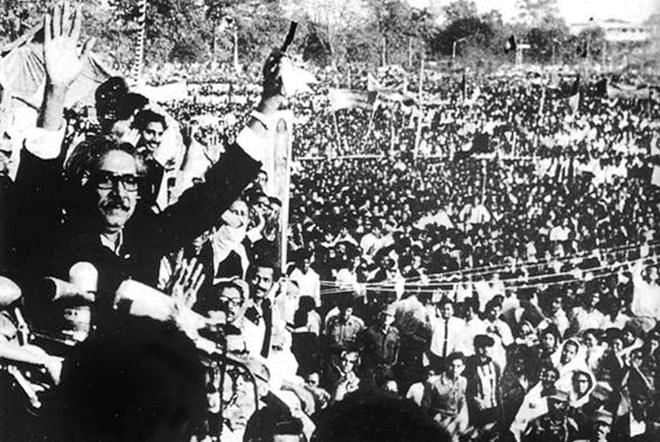The return of Bangabandhu
The return of Bangabandhu

BANGABANDHU Sheikh Mujibur Rahman returned to Bangladesh from imprisonment in Pakistan on January 10, 1972. He was accompanied by Dr. Kamal Hossain, who was also jailed in Pakistan. Bangabandhu had stopped in London and New Delhi on his way home.
He was our Nelson Mandela but in a Pakistani jail. Our War of Liberation was fought in his name under the leadership of his closest associates.
All great men begin humbly. Sheikh Mujibur Rahman was a great organiser and a critic of Pakistani rule, and later of the military dictatorship of Ayub Khan. He spoke of the disparity between East and West Pakistan and the injustice meted out to the former. Slowly he grew in stature. His increasing popularity frightened the Pakistani government and they made the mistake of starting the Agartala Conspiracy Case against him. Bangalees put great trust in his patriotism and loved him. Progressive politicians united under Maulana Bhashani and the All Party Students' Union also supported him whole-heartedly. The Pakistanis were forced to release him and he became our undisputed leader.
Meanwhile, Ayub Khan handed over power to Army Chief Yahya Khan. The latter held an election and allowed it to be free, thinking that East Pakistan had many Pakistan lovers and Sheikh Mujib would not emerge victorious. But Bangabandhu's Awami League won 167 out of 169 seats and the whole world recognised him as our undisputed leader. But the Punjabi ruling clique was not ready to transfer power. The conspiring Zulfikar Ali Bhutto was behind them. On the night of March 25, 1971, thousands of unarmed civilians were killed. Political activists, students and even passers-by were gunned down. Bangabandhu was ready and declared the independence of Bangladesh. He courted arrest thinking that it would save Dhaka from total destruction.
It took us less than nine months to win independence on December 16, 1971. All this time Bangabandhu was in captivity. But world public opinion and his liberal image forced the Pakistanis to set him free.
The great leader first went to London where Prime Minister Edward Heath welcomed him. Then he flew to New Delhi, where he spoke at the Safdar Jung Airport with Indira Gandhi beside him, and mesmerised his listeners. He returned to Dhaka on January 10, 1971. Thousands flocked to the airport to see him. His journey to Suhrawardy Udyan took more than an hour. Even on such a happy day a terrorist was caught with a bomb and a knife. He later admitted that he was sent to kill the great Bangalee leader.
The handsome leader had reduced by forty pounds in jail. He was a worried man there but not a frightened man. He thanked his people for freeing him and expressed his joy that we were a free nation at last. A man, a Bangalee and a Muslim die only once, he remarked. He had no fear of death. Now he would try his best to reconstruct his war-ravaged country.
We fought our noble War of Independence in the name of Sheikh Mujibur Rahman, our best ever political leader, an orator of the highest order and a giant with the soft heart of a Bengali mother. Our women prayed for his release from jail and our people fought heroically for independence. We Bangalees proved to the whole world that we were a heroic nation and the leader who turned us into a confident and united nation was none else than Bangabandhu himself. Our losses were great but we were a free nation. Our future generations would not be colonial citizens any more.
As a ruler, Bangabandhu had to build the war-ravaged country from zero. That was not an easy task. The most powerful nation in the world was against our independence and their government was yet to forgive Bangabandhu. So they successfully created a distance between Bangabandhu and some of his most trusted men. Despite his best efforts, our great leader had failure as well as success. But he certainly didn't deserve death for that. That was a period when great nationalist leaders were not allowed to survive. Bangabandhu, Allende and the like had to embrace martyrdom and make way for military rulers, who served as yes-men to the mightiest nation. When we think of Bangabandhu's tragic death, we are engulfed with unbearable sorrow.
How do we remember Bangabandhu now? What is he to me? To our one hundred and fifty million people? He is the selfless leader who fought his whole life for an independent country for his Bangalee brothers and sisters. He achieved his goal although he had to leave tragically after a few years like quite a few third-world nationalist leaders. He loved his people them to a fault and they love him in return. As long as the Padma and the Meghna are there, Bangabandhu will be fondly remembered by his people.
The writer is a novelist and critic and a researcher on Bangladesh's history.